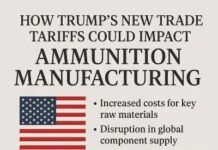I know you won’t do it, but I want to encourage you anyway. Go listen to the oral arguments attached to the blog entry entitled, “Supreme Court Hears Oral Arguments in Mexico’s Lawsuit against Smith & Wesson.” That blog entry is a much longer version of this editorial, and there’s an MP3 audio file and a PDF attached to it. I recommend listening to the MP3 file while scrolling the PDF document to understand the terms and complex case law mentioned in the oral arguments. It takes about 90 minutes if you don’t stop too often to rehear certain sentences. What, you say? That blog is TLDR, and you want the Cliff’s Notes version instead? Okay, here we go.
On March 4, 2025, the U.S. Supreme Court heard oral arguments in Mexico’s lawsuit against Smith & Wesson, which seeks to hold U.S. gunmakers accountable for gun-related crime in Mexico. This part of the case isn’t to hear the merits or evidence. It’s to determine if the case can even be brought under the Protection of Lawful Commerce in Arms Act (PLCAA).
In its 2021 lawsuit, styled as Smith & Wesson Brands v. Estados Unidos Mexicanos on appeal to the Supreme Court, the Mexican government accused Smith & Wesson, Colt, and other U.S. gunmakers of knowingly selling guns to a small set of Federal Firearms License dealers who break American law and move guns to straw purchasers and other illicit buyers, to the tune of 2 percent of U.S. production. That’s about 300,000 guns a year. The straw purchasers then somehow arrange to deliver that quantity of firearms to criminals in Mexico, in particular, drug cartel members. I don’t know about you, but that seems like an awful lot of guns for penny-ante straw buyers to move, even if there are thousands of such straw buyers. If there were 10,000 such straw men and women, they’d still have to move 30 guns a year apiece. Something seems wrong about all of those numbers. Moving that kind of quantity seems more like what an institutional cross-border buyer, like, say government agencies in Mexico, might do. But I digress.
Noel Francisco, lawyer for the plaintiffs Smith & Wesson Brands, Inc. and others who petitioned the case to the Supreme Court, said, “If Mexico is right, then every law enforcement organization in America has missed the largest criminal conspiracy in history operating right under their nose, and Budweiser is liable for every accident caused by underage drinkers since it knows that teenagers will buy beer, drive drunk and crash.” Good line, and true.
Lawyers for the gunmakers say the federal immunity law, PLCAA, with the acronym pronounced “Plikka” or “Plakka,” protects the companies from liability that results from “criminal or unlawful misuse” of a firearm by a third party.
To get around PLCAA’s protections, Mexico’s legal team honed in on a narrow “predicate” exception to PLCAA liability that allows a gun manufacturer to be sued. PLCAA was a bipartisan measure passed to protect gun companies from being sued by anti-gun cities and states and gun-control organizations with the intent of bankrupting the gun companies with legal fees.
The district court ruled in favor of the manufacturers, and Mexico appealed. The Boston-based 1st U.S. Circuit Court of Appeals agreed that while the protections of PLCAA were applicable to the manufacturers, they might still be liable under the predicate exception.
Francisco, a former solicitor general of the United States, said that Mexico’s “theory is that federally licensed manufacturers sell firearms to licensed distributors, who sell to licensed retailers, a small percentage of whom sell to straw purchasers, some of whom transfer to smugglers, who then smuggle them into Mexico, hand them over to cartels, who in turn use them to commit murder and mayhem, all of which requires the government of Mexico to spend money.
“Needless to say,” he continued, “no case in American history supports that theory, and it’s squarely foreclosed by the Protection of Lawful Commerce in Arms Act.”
In one exchange that highlights the irony of the Mexican government’s suit reaching the Supreme Court, Justice Ketanji Brown Jackson pressed the Mexican government’s attorney, Catherine Stetson, about whether PLCAA was intended to bar lawsuits like Mexico’s.
“I worry that we’re running up against the very concerns that motivated this statute to begin with,” Brown Jackson said during the oral arguments. “All of the things that you ask for in this lawsuit would amount to different kinds of regulatory constraints that I’m thinking Congress didn’t want the courts to be the ones to impose.”
Wow, bingo, Justice Brown Jackson. Here’s hoping at least four other justices agree with you. It should be eight, but I’ll settle for four.
Anyway, if you have the time, listen to the oral arguments. I didn’t intend to listen to the whole danged thing, but you rarely get a chance to hear history in the making, for good or ill.
— Todd Woodard





























